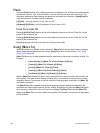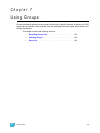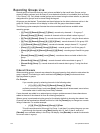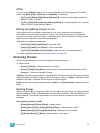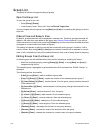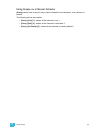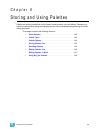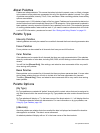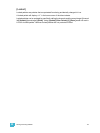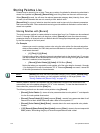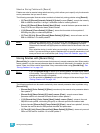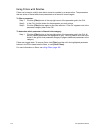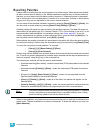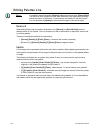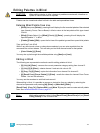140 Ion Operations Manual
About Palettes
Palettes are referenced data. This means that when included in presets, cues, or effects, changes
to the contents of the palette are propagated into all of the places the palette is stored. Four types
of palettes are available; Intensity, Focus, Color, and Beam. When recording palettes, three softkey
options are available.
Ion supports up to 1,000 palettes of each of the four types. Palettes can be recorded as decimal or
whole numbers and are automatically filtered into IFCB categories. Color data cannot be placed in
beam palettes, intensity cannot be included in focus palettes, and so forth. This makes the process
of creating palettes easier, faster and less work. If you need to create a reference that will include
a mix of IFCB information, presets can be used. See “Storing and Using Presets” on page 151.
Palette Types
Intensity Palettes
Intensity palettes can easily be created for use with all channels that have intensity parameter data.
Focus Palettes
Focus palettes can be created for all channels that have pan and tilt functions.
Color Palettes
Color palettes can be created for all channels that have any color parameter data. Color palettes
store any combination of color data, including CMY, RGB, and HS settings, color scrollers and color
wheels.
You will find that [Record Only], filter settings, and selective store commands will be very useful
when storing color palettes.
Beam Palettes
Beam palettes can be created for all channels that have any beam parameter data. It is rare when
storing beam palettes that you will wish to include all of the beam parameters for channels.
Therefore, [Record Only], filters, and selective store commands will be very useful when storing
beam palettes.
Palette Options
{By Type}
By Type palettes are created with 'default' channels which contain values that can be assigned to
any other channel within the same fixture type. By Type palettes can also contain discrete channel
values.
By Type palettes will display a ‘T’ in the lower corner of the direct selects. A ‘+’ will display after the
‘T’ if there are channels stored with discrete data. For more information on by type palettes, see
Using By Type Palettes, page 150.
{Absolute}
Absolute palettes are palettes that when recalled the data is displayed and treated like absolute
data applied to a channel. The data is never referenced.
An absolute palette will display with an ‘A’ in the lower corner of the direct selects.



